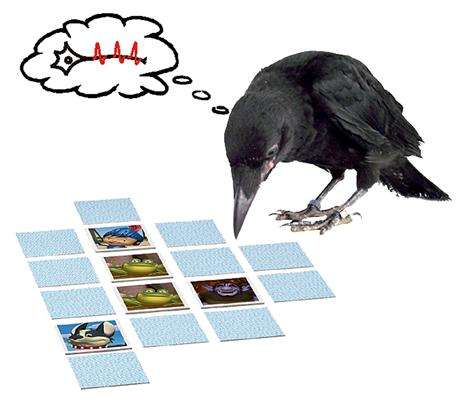Short-term memory of crows relies on different neural mechanisms than humans

German researchers discover neurons allowing crows to remember short-term – although their brains are different from ours.
An important prerequisite for intelligence is a good short-term memory which can store and process the information needed for ongoing processes. This "working memory" is a kind of mental notepad – without it, we could not follow a conversation, do mental arithmetic, or play any simple game.
In the animal kingdom, the group of birds including crows and ravens – the corvids – are known for their intelligence because they have just such a working memory. However, their endbrain – which is highly-developed but has a fundamentally different structure from that of mammals – has no cerebral cortex; and that is the part of the brain which in mammals produces the working memory. How do corvids manage to store important information from moment to moment?
To answer that question, three researchers from the Institute for Neurobiology at Tübingen University taught crows to play a version of the children's game of "pairs." Using a computer monitor, Lena Veit, Konstantin Hartmann and Professor Andreas Nieder briefly showed the crows a random image. The crows had to remember it for one second before choosing the same image from a selection of four by tapping the remembered picture with their beaks. In order to choose the correct image, they must have stored it in a working memory – which they appeared to do quite easily.
Simultaneous measurements of electric potentials in the crows' brains showed that nerve cells in one particular area of the endbrain were responsible for this capacity to remember. Although the image had disappeared from the screen, those cells remained active during the short period of remembering – retaining the information about the image until the crow retrieved it in order to make the right choice. If a crow couldn't remember and selected a wrong image, those particular endbrain cells were barely activated. Prolonged activation of such cells ensured that important information could be stored and later accessed.
Professor Nieder and his team conclude that cognitive abilities are possible in a range of differently-structured brains. "Clearly, a good working memory – an important characteristic of human beings – can also exist without a layered cerebral cortex. The corvids' fundamentally differently-structured endbrain shows that evolution has found a number of independent solutions," says Lena Veit.
There are great benefits in the ability to temporarily store information. "An organism with a good working memory is intelligent; it is released from the compulsion to respond immediately to stimuli," says Professor Nieder. "The big question is now – how do neural networks in the brain have to be composed in order to actively store and process information?"
More information: Lena Veit, Konstantin Hartmann & Andreas Nieder: "Neuronal Correlates of Visual Working Memory in the Corvid Endbrain." Journal of Neuroscience, June 4, 2014, DOI: 10.1523/JNEUROSCI.0612-14.2014















